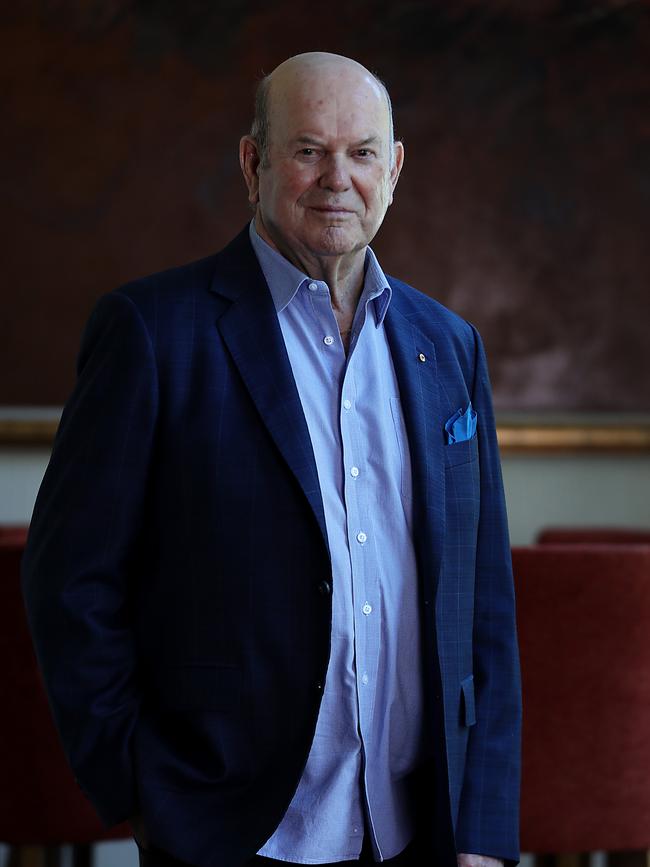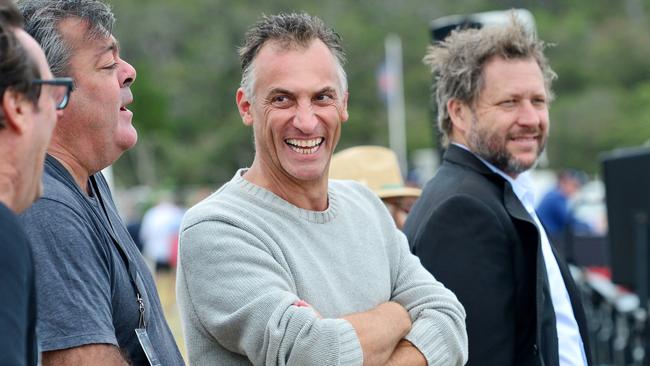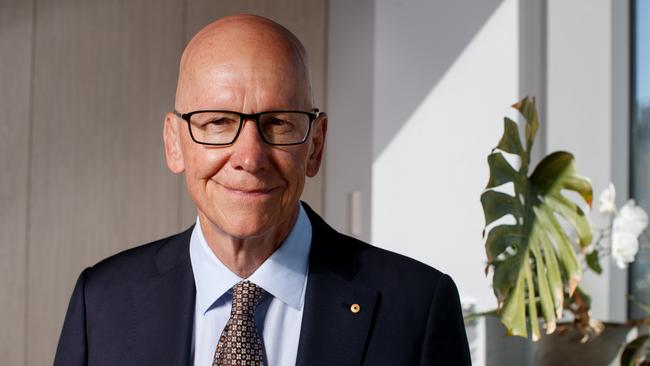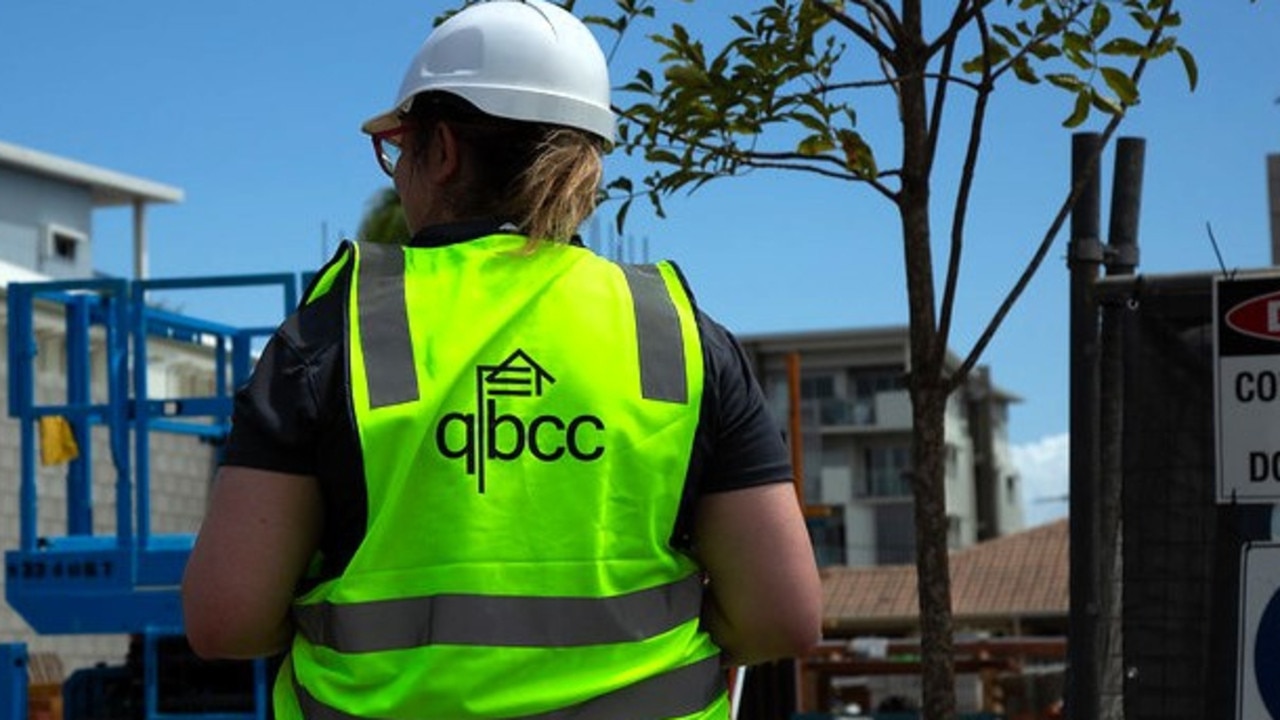Nick Bolton: The activist investor corporate Australia loves to hate
Nick Bolton shot to fame when he took on Macquarie and won at 26 years of age, netting himself a $4.5m payday from an $80,000 investment. Now Magellan is in his sights.

Business
Don't miss out on the headlines from Business. Followed categories will be added to My News.
For Trevor Rowe it could have been yesterday. The former chairman of BrisConnections describes him as “destructive” and “self interested” and warns retail shareholders to be careful.
Meet Nick Bolton, the 41-year-old activist investor more likely to be seen sitting in the sun at super luxury Byron resort Raes on Wategos than walking the streets of power in Sydney or Melbourne.
Bolton shot to fame when at 26 he took on Macquarie Bank and Leighton Holdings over Queensland toll road operator BrisConnections and won, netting himself a $4.5m payday from an $80,000 investment. Bolton had snapped up the securities, which had fallen as low as 0.1c with no bids, and threatened to wind up the financially ailing company.
Now he is taking on the $1bn-plus Magellan Financial Group. This time, he has been hoovering options in its underperforming Magellan Global Fund (MGF) and trying to have the fund either reach its net asset value, be wound up, Magellan replaced as its manager, or — presumably — receive a big payout from the company to go away, as he managed to do with BrisConnections.

Views on Bolton range from the champion of the little people — the retail investors in underperforming companies — to a private school-educated cad looking for quick ways to make a buck from those having short term problems.
Rowe certainly puts him in the latter range.
“He was destructive in terms of what he endeavoured to do in terms of disrupting the management processes,” and his behaviours were “unnecessary, destructive, costly and expensive for shareholders,” said Rowe with the memories fresh even 15 years later.
“My experience was that his objective is self interest, not necessarily the interest of all other shareholders.”
“That’s my judgment call.”
It’s not surprising that Rowe’s memories aren’t fond. And it’s pretty likely that Magellan chairman Andrew Formica’s won’t be either.
Aspects of Bolton’s approach to both companies have been similar.
“Magellan is BrisConnections on steroids,” is how Raes owner and Keybridge director Antony Catalano describes the opportunity Bolton is currently looking to exploit.

His BrisConnections angle was to find something dramatically mis-priced and use it for leverage, and his public campaigning led to its stapled security-holders being released of the liability to make two more ongoing repayments — although they did not get the payout Bolton received. The company was eventually bought by Transurban from its receivers.
This time his activism has forced Magellan to announce units in the closed-end listed class MGF would become open, allowing holders to get their money out at net asset value, but possibly not before the unit holders options expire in March 2024.
Bolton wants more, but it’s a start.
For those at the companies he targets, highlighting their weaknesses is an embarrassment, although to Rowe’s point also possibly “disruptive” and “costly,” particularly given the agitator won costs against BrisConnections.
Attracted to arbitrage
Bolton is attracted to arbitrage. It was a concept first described to him by an economics lecturer at the University of Melbourne.
“Arbitrage is a disproportionate return for the relative risk,” explained Bolton. “And the lecturer gave an example where if a $20 note was sitting on the pavement it would be instantly picked up by someone and therefore that opportunity to pick up that note doesn’t exist. I really struggled with that analogy, and said, ‘well how do you be the guy that picks up that $20?’ That’s the premise behind a lot of my trades. I look for mis-pricings in the market.”
On that, MGF delivers in spades. Magellan, as the parent company, has the obligation to fund the roughly $150m required to exercise all outstanding options — at a 7.5 cent discount — and carries it as a liability on its balance sheet as a result.
In simple terms it means Keybridge could exercise its options and pay 92.5c in the dollar — if it had the capital — and Magellan would have to pay the remaining 7.5c.
It’s money the beleaguered fund manager, already dealing with falling profits and a dramatic downward spiral of funds under management, would not want to pay.
“I understand conflicts and duties very well and in this case they have a serious conflict of interest,” said Bolton. “You asked how I found this trade. I started with this conflict of interest scenario and worked backwards.”
In this case, Magellan receives a roughly $140m management fee for MGF, (including $40m for the closed class). And yet, if it performs well enough that its units start trading at their net asset value, then its options will be above the water and Magellan will have to fork out the promised $150m to bring them to the market.
“It’s the responsible entity’s job to ensure member’s interests are protected, including the ability to exit the fund at fair value. It was in Magellan’s interest for this not to happen because they don’t want to pay this $150m,” said Bolton.
Bolton’s plans to call a meeting and wind up MGF hit a snag last week when Magellan took his listed vehicle Keybridge to court and successfully argued that the backing of 118 unit holders Bolton had pulled together did not meet the restrictive wording in the constitution. Bolton is not perturbed, saying the judge ordered Magellan to pay costs and he will now call a meeting using a different provision in Section 252B to remove Magellan as the responsible entity instead, on the grounds it has consistently traded at a discount to net asset value.
Whatever happens from here, Bolton’s agitations have improved the position of the MGF unit holders if price and Magellan’s now-stated commitment to an exit plan for unit holders is any judge.
Any press is good press?
Why then the loathing for Bolton that is quickly evident from Google searches?
The corporate watchdog ASIC has certainly had him in their sights, having banned him from being a director for three years post the BrisConnections saga because of his involvement in 13 companies which failed owing creditors $25m. Bolton counters, saying he fiercely disagreed with the decision. He had just taken over the firms in question and had only been a director for 66 days before realising they needed voluntary administration. He’s still funding the liquidator to recover money owed to creditors, most of which are Keybridge. The decision was appealed for 8 years without a result, well after the ban expired.

Clearly Bolton loves a fight when he thinks he is right.
“I like things to be just and have strong opinions,” he admitted.
Regardless of whether he’s winning or losing, his love of a legal battle should make him every lawyer’s best friend.
Even now with the Magellan matter kicking off, he’s also currently trying to stymie radio giant ARN’s attempts to take over rival Southern Cross Austereo — which Keybridge owns shares in — by complaining to the Takeovers Panel that the latter breached the Corporations Act.
Bolton discloses he has probably spent upwards of $30m on legal fees since his BrisConnections days.
But even views on whether he’s besties with the legal fraternity is mixed. His knockers say no firm will work for him because he doesn’t pay his bills. Bolton responds that apart from one firm where he took issue with the standard of advice, he’s been “loyal” to five individual lawyers for the past 15 years.
Case in point is Tony Hartnell, founding chairman of ASIC and founding partner of Atanaskovic Hartnell, which was Bolton’s firm before it was disbanded after one of its lawyers stole money from clients, and who now sits on the board of Bolton’s Aurora Funds Management.
Wilson v Bolton
High profile fund manager Geoff Wilson says he is not a believer in Bolton, a somewhat odd position given his firm owns shares in Keybridge and Keybridge in turn owns shares in Wilson Asset Management Active Fund.
Wilson describes him as “a corporate leech,” who thinks he’s the smartest guy in the room.
“He’s just destroyed an enormous amount of value for himself and everyone,” said Wilson.
After Wednesday’s courtroom defeat of Keybridge by Magellan, Wilson described Bolton’s strategy to realise value from the MFG options as “naive … odds are the options will expire worthless,” says Wilson.
Why then does the Wilson Asset Management group continue to own shares in Bolton’s Keybridge and rack up double digit appearances before the Takeovers Panel, as well as be invested in other listed companies partly colonised by Bolton or one of his affiliates?
Wilson says his shares in Keybridge’s fund are so small as to be inconsequential and any overlap with Bolton’s other activities coincidental. Just the unintended outcome of two investors identifying value in the same stock.

Wilson and Bolton have been butting heads since 2010.
To an observer, it could appear that this is an old established buck getting territorial with a younger buck that wants to do things differently. Wilson and Bolton both disagree. And Wilson is certainly less likely to play in the shades of grey.
Bolton, for his part, says he “wishes (Wilson) well” and hopes Wilson makes a lot of money out of his Keybridge shareholding.
“One thing I don’t understand is the animosity he’s brought to this over the last few years. I’m bemused by it. If we launch a takeover bid for something, he’ll launch a takeover bid, or buy a blocking stake.”
Apart from an apparent interest in the same companies, the established Wilson and outsider Bolton also share interests in some things outside of the stereotypical finance-operative’s norm. Wilson is passionate about meditation and alkaline bodies.
Bolton doesn’t like plant seed oils and thinks they are problematic for human digestion. He moved up to Byron Bay from Melbourne during the pandemic and lives with his partner on one of, if not the most, lovely private patches of nature-meets-beachfront in the region.
But Wilson has now made his fortune and Bolton is still an up-and-comer — he hopes.
Bolton went to school at Melbourne’s exclusive Wesley College, where he points out he wasn’t part of the ski-weekends set. His parents made sacrifices to send him and his two sisters to good schools.
And despite studying a double degree in commerce and science — which he didn’t finish — his first “proper job”, which one of his sisters helped him get, was in visual effects at Warner Bros. on the Gold Coast for the movie Scooby-Doo.
His favourite city is New York, where he finds “the energy that exudes on the streets is very stimulating,” and has a cafe in Soho called Ground Support.
Whether he will get the kind of ground support needed to wrestle MGF from Magellan will soon be known.
Catalano says Bolton’s “nostrils have now flared” after losing the Magellan court battle last week on what he believes is a technicality, and thinks his actions to get MGF up to its net asset value helps all investors.
“Some people might think it’s self serving … but in many ways he is a champion of the shareholders,” said Catalano.
If Magellan proceeds with its current tactic and risks management rights of MGF, “it would be a wipe-out. They’ve lost credibility … it will be armageddon for Magellan if that happens.”
Bolton thinks it was probably an accident in the wording of the constitution that prevented him winning his first court battle with Magellan.
And as for comments describing Bolton as self interested, the 41-year-old points that claim straight back to Magellan.
“They are happy to monetise their accident in their own interests,” he says.
And while Rowe might be right when he says that Bolton doesn’t necessarily “act in the interest of all other shareholders” when he makes a play for a company, he is certainty good at pointing out when the directors of the company, who are paid to do just that, are not either.
Originally published as Nick Bolton: The activist investor corporate Australia loves to hate





